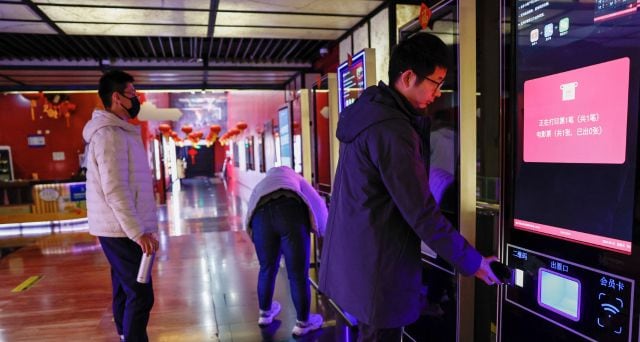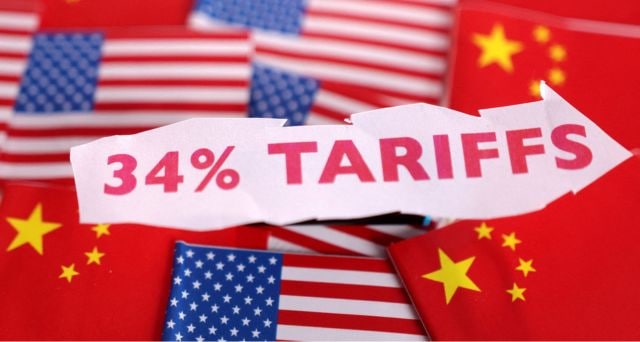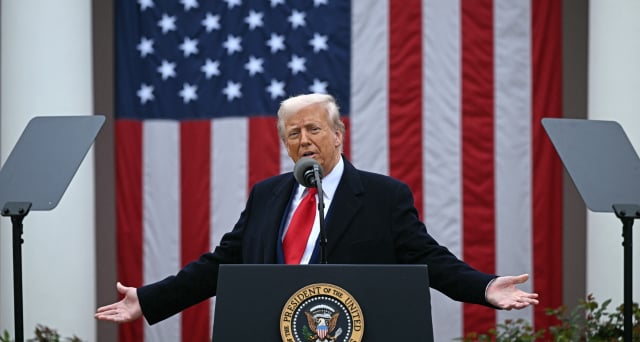US President Donald Trump has followed through on his threat to impose ‘additional 50 per cent tariffs’ on China, pushing the total tariff rate to a record 104 per cent. In response, Beijing is considering retaliatory options, including a plan to ‘reduce or ban’ the import of US films. If implemented, the move could cost Hollywood hundreds of millions in revenue.
)
China has played a part in driving the global box office performance for American studios
The trade war between the United States and China has escalated to a new level.
US President Donald Trump has acted on his threat of imposing “additional 50 per cent tariffs” on China, taking the total tariff rate to an unprecedented 104 per cent.
Meanwhile, Beijing on Wednesday hit back at Donald Trump’s 104 per cent tariffs by announcing additional tariffs of 84 per cent on all American goods.
China’s finance ministry said the additional tariffs on US goods will take effect from April 10, news agency Reuters reported. Notably, Beijing’s retaliatory tariff rate on American goods has risen from the earlier announced 34 per cent.
Amid this standoff, reports have emerged suggesting that China may be considering a ban on Hollywood films in the country.
In this report, we look at what is currently known about the potential ban, the impact it could have on the global entertainment industry, and other ways China might retaliate against Trump’s tariffs.
Is China banning Hollywood movies?
China holds the position of the world’s second-largest film market.
While earnings for US studios in the country have dropped sharply in recent years as local audiences lean more towards homegrown Chinese-language blockbusters, China has still played a part in driving the global box office performance for American studios, according to The Hollywood Reporter.
So far, the American film industry has managed to avoid being affected by the escalating tit-for-tat measures announced between China and the United States, since theatrical film releases and streaming platforms fall under the category of services rather than physical goods.

Two well-known Chinese bloggers recently shared identical posts detailing the possible steps authorities are considering to respond to the latest tariff threats from Donald Trump.
These include imposing tariffs on American agricultural products and possibly banning Hollywood films.
According to Bloomberg, the proposed steps include “reducing or banning the import of US films” among other options.
The information was posted simultaneously on Chinese social media by Liu Hong, a senior editor at the state-backed Xinhua News Agency, and Ren Yi, a widely followed commentator and grandson of Ren Zhongyi, former Communist Party chief of Guangdong Province.
Even if a total ban is not imposed, experts anticipate a notable slowdown in the import and promotion of US films.
Stanley Rosen, a political science professor at USC who focuses on US-China relations, told the Los Angeles Times, “For those films [the Chinese government] might accept, they’re not going to promote them.”
If China goes ahead with such a move, Hollywood could face losses amounting to hundreds of millions in revenue. The ban may also restrict global audiences from accessing some of the year’s most anticipated films.
How else is China planning to respond to the tariffs?
Apart from the measure of ‘reducing or banning the import of US films’, China is reportedly considering a number of other steps to counter Trump’s tariff move.

According to Bloomberg, the potential measures include:
Banning the import of US poultry
“Significantly” increasing tariffs on American agricultural goods such as soybeans and sorghum
Halting cooperation between China and the US on fentanyl-related matters
Launching investigations into the intellectual property benefits of US firms operating in China
Placing restrictions on American service sectors doing business with China
US-China trade war
Last Friday, China unveiled a 34% tariff on all US imports, along with export restrictions on rare earth minerals and a host of other retaliatory steps in response to Trump’s “Liberation Day” tariffs.
In the wake of China’s countermeasures, Trump issued a warning to Beijing, insisting it drop the new tariffs or face an added 50 per cent tariff, set to take effect on April 9.
China, however, appeared unwilling to back down, vowing to “fight to the end” and labelling the US actions as “blackmail”.
Now, top Chinese leaders are expected to gather to discuss ways to support the economy and steady capital markets amid the deepening trade tensions, Reuters reported citing sources.
Those likely to attend include senior members of the State Council, or cabinet, alongside representatives from key government and regulatory bodies, the report said.
Trump’s sweeping tariffs have disrupted a decades-old global trade framework, sparking concerns of a recession and causing a sharp drop in stock markets worldwide.

The trade war has landed at a difficult moment for China, with its economy already under strain from a prolonged property sector crisis and huge local government debt, weighing heavily on business and consumer confidence.
Together, the US and China make up a major share of the global economy – about 43% this year, according to the International Monetary Fund.
If both were to enter a full-scale trade war that slowed their economies or tipped them into recession, it could drag down growth across other nations as well.





